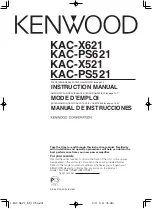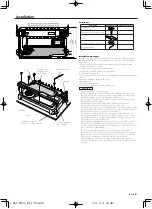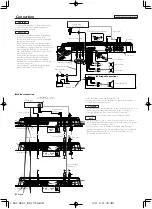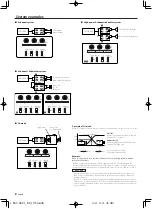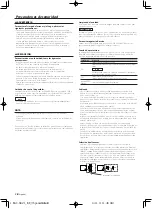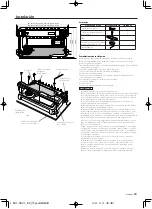
English
5
Controls
1
Fuse (KAC-X621/PS621 : 25 A × 3 , KAC-X521/PS521 : 30 A × 2)
2
Battery terminal
3
Ground terminal
4
Power control terminal
Controls the unit ON/OFF.
NOTE
Controls the unit power. Be sure to connect it with all the systems.
5
Speaker output terminals
• Stereo Connections:
When you wish to use the unit as a stereo amplifier, stereo connections are
used.
The speakers to be connected should have an impedance of 2Ω or greater.
When multiple speakers are to be connected, ensure that the combined
impedance is 2Ω or greater for each channel.
• Bridged Connections:
When you wish to use the unit as a high-output monaural amplifier,
bridged connections are used. (Make connections to the LEFT channel
9
and the RIGHT channel
·
SPEAKER OUTPUT terminals.)
The speakers to be connected should have an impedance of 4Ω or greater.
When multiple speakers are to be connected, ensure that the combined
impedance is 4Ω or greater.
2
CAUTION
The rated input of the speakers should be no less than the maximum output
of the amplifier. Otherwise malfunction may result.
6
RCA cable ground lead terminal
When using an RCA cable with a ground lead attached, connect the ground
lead to this terminal.
7
ID NUMBER switch
Sets an amp identification number (ID) to be used for amplifier control from
the Center Unit.
Assign ID Number "0" to an amplifier when you use it as the Master amplifier.
Assign ID Numbers "1" to "7" to amplifiers when you use them as Slave
amplifiers. Do not duplicate these numbers.
NOTE
After you have changed ID numbers of amplifiers, turn Off the POWER switch
of the Center Unit and turn it On again.
8
TO H/U terminal
After you have set the Master amplifier, connect it to the Center Unit.
9
REMOTE terminals
Used to connect to Slave amplifiers.
0
RESET button
Resets the microprocessor of the unit.
NOTE
The values you have set with the Amplifier Control are NOT reset.
!
LINE IN terminal
@
LINE OUT terminal
The signal that’s input from the line input terminal is output.
#
Power indicator
Lights when the POWER switch is turned On.
The indicator flashes several seconds when the POWER switch is turned On
or when the Protection function is activated.
$
LPF FREQUENCY control
Sets the cutoff frequency when the "FILTER" switch is set to "LPF".
%
HPF FREQUENCY control
Sets the cutoff frequency when the "FILTER" switch is set to "HPF".
^
FILTER switch
This switch allows to apply high-pass or low-pass filtering to the speaker
outputs.
• HPF (High-Pass Filter) position:
The filter outputs the band of higher frequencies than the frequency set
with the "HPF FREQUENCY" control.
• OFF position:
The entire bandwidth is output without filtering.
• LPF (Low-Pass Filter) position:
The filter outputs the band of lower frequencies than the frequency set
with the "LPF FREQUENCY" control.
The speaker output is automatically switched to monaural (L+R).
&
AMP CONT (amplifier control) switch
Used to bypass the circuit when you do not control the sound with the
Amplifier Control.
• ON position:
Allows you to control the sound with the Amplifier Control.
• OFF position:
Bypasses the Amplifier Control circuit.
NOTE
Amplifier control is possible even while OFF.
*
ISF (infrasonic filter) switch
When this switch is "ON", the frequencies which are below the audible
range and therefore inaudible are cut off so that the quality of the audible
frequencies can be improved.
(
OPERATION switch
This switch is used to select the operation mode of the amplifier.
• STEREO position:
The amplifier can be used as a stereo amplifier.
• MONO (Lch) position:
Amplifies the signal input from the left side only. Set to this position and
make bridged connections to use as a high-power monaural amplifier. (The
input right signal is not output.)
)
INPUT SENSITIVITY control
Set this control according to the pre-output level of the center unit
connected with this unit.
NOTE
For the pre-output level, refer to the "Specifications" in the instruction manual
of the center unit.
��
��
��
��������
�
��
����� ��
�����
������
�� ���
�� ������
��
�
�
� � � �
�
�
��
��
��������
�
��
�����
��������������
���
�������������
���
�������������
�
�
��������
������
�
�
���
���
��
���
��
���
���
���
��
���
���
��
������
���
���
���
��� ����
��
���
���
��
���
���������
���������
������
��� ���������
��� ���������
�� ��
�� ��
��� ��
��� ��
��� ��
��
���
���
���
��
��
�
��
��� ���
���
�� ����
�� ��
��� ���
���
�� ����
���
���
���
��
��
�
����
���
����
����
�����
��������������
���
�������������
���
�������������
�
�
��������
������
�
�
���
���
��
���
��
���
���
���
��
���
���
��
������
���
���
���
��� ����
��
���
���
��
���
���������
���������
������
��� ���������
��� ���������
�� ��
�� ��
��� ��
��� ��
��� ��
��
���
���
���
��
��
�
��
��� ���
���
�� ����
�� ��
��� ���
���
�� ����
���
���
���
��
��
�
����
���
����
����
�
�
� � �
�
�
�
�
�
�
�
�
�
�
�
�
�
�
�
KAC-X521/
KAC-PS521
KAC-X621/
KAC-PS621
1.KAC-X621̲KE̲1US.indd
04.1.9, 11:45 AM
5

